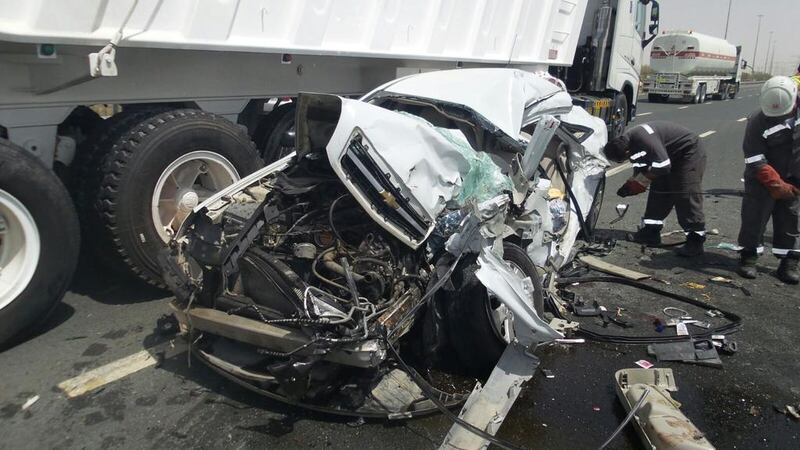ABU DHABI // Jailing dangerous and reckless drivers for 24 hours would make the country’s roads safer and teach irresponsible motorists a lesson they will not forget, according to residents and police.
The Federal Traffic Council suggested detaining people who did not follow the rules of the road or who broke the speed limit by more than 60 kilometres an hour, said Maj Gen Mohammed Al Zafeen, FTC chairman and assistant commander-in-chief of operations for Dubai Police.
At present, those caught driving recklessly could have 12 black points added to their licence, be fined Dh2,000 and have their vehicle confiscated for 30 days.
While severe, these penalties were not a powerful enough deterrent, said Nisrine Dakheel. The Dubai resident said authorities should take punishments a step farther by denying people their liberty, even if only briefly. “Maybe after spending one night in jail they’ll think twice before driving dangerously, bearing in mind the harsh consequences,” said the 30-year-old, who added there should also be a focus on educating drivers while they are in custody.
“It’s not only enough to put them in jail for a day, but also educate them about the dangers of their behaviour,” said the Jordanian, who has lived in Dubai for seven years. “Maybe also implementing a community service sentence or giving them an opportunity to meet people who were severely injured in such incidents.”
Saif Abdullah Al Hosani knows first-hand the consequences of driving dangerously. The Emirati suffered multiple injuries after falling from his motorcycle while travelling at about 200kph. He knows he is lucky to be alive.
“I really wasn’t aware that I was driving that fast and so when I tried to turn, the bike flipped over and I was left with injuries to my neck, hand, knee and foot,” the 38-year-old said.
“If the council’s recommendation is passed, I think incidents will decrease because a person would think of the serious consequences.”
Mr Al Hosani is thankful he did not have a passenger on his motorcycle when the accident happened.
“It’s not just about hurting yourself – driving recklessly can lead to the injury and death of someone else,” he said. “You could be affecting a whole other family.”
Mr Al Hosani is undergoing rehabilitation at Amana Healthcare in Abu Dhabi. He has been part of the inpatient programme for about a month and a half and will go to Germany next week for treatment.
Robert Dorsett, a physiotherapist at Amana Healthcare, said Mr Al Hosani could have ended up a quadriplegic. “He had a broken neck and he had to have surgery,” he said.
Maj Gen Al Zafeen said a quarter of all fatalities on the country’s roads were a result of reckless driving. “They are putting their lives and the lives of others in danger.”
In Abu Dhabi, 100,000 tickets were issued in the first three months of this year for speeding and dangerous driving.
Lt Saoud Al Shiba, from Sharjah Police Traffic Awareness Department, said jailing dangerous drivers would be effective in cutting the number of accidents.
“Locking up reckless motorists for 24 hours is a great recommendation that will help in enforcing the traffic law,” Lt Al Shiba said. “We need to use any methods or laws we have to limit accidents and fatalities, whether with awareness campaigns or locking up drivers.”
Eight people were run over and killed in Sharjah in the first three months of this year while last month, police issued 8,036 fines to motorists for abrupt changes of lane and failure to use turn signals.
dmoukhallati@thenational.ae
tzriqat@thenational.ae






